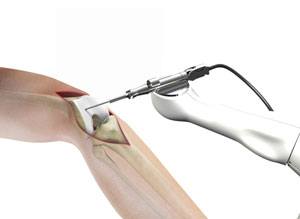
Specialist in Robotic-Assisted Partial Knee Surgery in MA
Robotic-assisted partial knee surgery is an innovative surgical technique that can benefit people who have degenerative knee diseases such as osteoarthritis (early-to-mid-stage). Dr. Van Flandern provides diagnosis and minimally-invasive partial knee surgery using robotic-arm technology in MA. Dr. Van Flandern also provides the highest level of care during and after the surgery. Contact Dr. Van Flandern’s office for an appointment today!

What is Robotic-Assisted Partial Knee Surgery?
Robotic-assisted partial knee surgery is an innovative alternative to the conventional surgical procedure to treat degenerative knee diseases such as osteoarthritis. It is performed using robotic-arm technology that allows your surgeon to precisely perform the surgery through small incisions.
Indications for Robotic-Assisted Partial Knee Surgery
The procedure is beneficial for unicompartmental or bicompartmental knee disease. Robotic-assisted partial knee surgery can be considered if you have early-to-mid-stage osteoarthritis associated with symptoms such as knee pain, knee swelling, and knee locking. The procedure results in resolution of symptoms and a natural knee movement.
Robotic-Assisted Partial Knee Surgery Procedure
This procedure utilizes X-rays and CT scans to determine the damaged areas of the joint that need to be removed for the precise placement of the knee implant. In partial knee resurfacing, only the diseased portion of your knee is removed, preserving the surrounding healthy bone and tissue. An implant is then secured over the prepared portion of your knee joint that results in resolution of symptoms and natural knee movement. As it employs a minimally invasive technique, the incidence of scarring and blood loss is very low.
Benefits of Robotic Assisted Partial Knee Surgery
The benefits of the robotic-assisted partial knee surgery include:
- Smaller incisions
- Rapid recovery
- Precise placement of the implant
- Reduced injury to adjacent tissues
- Increased longevity of the implant






